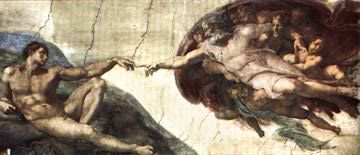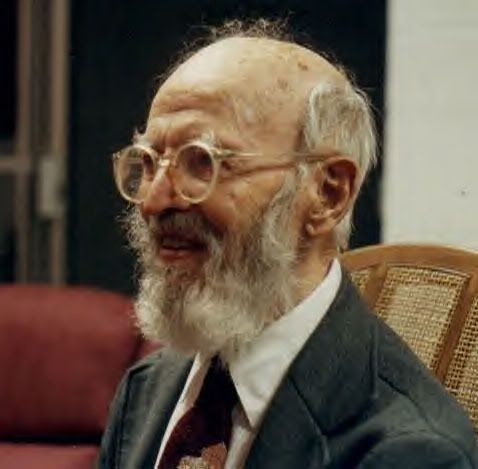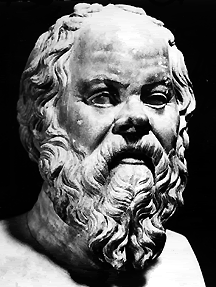The second thing you are going to say is "whut about all them there creatoinismists and fundametnalismists?" Yes, there are some pretty stupid religious people, but they never seem to say "If science is something whut I don't do, or I don't know about, it must be dumb." I never hear creationists science is stupid, why I learn science,science isn't worth knowing about. Some of them may say that about evolution but they do not saying it about science. Then of course really dumb people have the idea that "well science gives us stuff." It's worth something because it gives us stuff. Of course theology just gives us a bunch of fairly tales. Of course, they think that because they don't know anything about it. When you suggest they learn about it they go "I don't not'n about that so it must not be worth learning." So in other words, theology is no good, because it's unknown to me, and if I haven't learned about something I can't learn about because it may not be worth learning about. The smart people reading this will see immediately this is not a smart person attitude. Smart people like to learn, this is a stupid person's attitude. Learning is only important if I can get some immediate pay back that I can see in the concrete here and now. This is not the way intelligent people think.
Every day people send me comments (most of them I toss) such as these. They are so ignorant they don't even know that theology is considered part of the intellectual mileu and that it's covered in the major universities of the world. That's becasue these people are the one's who don't know and don't think. They take their ques from the learder man, her furer Dawkins, who is a cretan and very anti-intellectual. But he has the mystique of scinece, so (even though he is not a scistist but only Meuseium curator) his peanut gallery would never dare question him and beileve everything he says; because they themselves are empty headed and don't know. Well her furer Dawkins says theology is no good, and sicne I never heerd o it, It must not be no gooooood."
I think it's pretty clear that a large reason for the influx of atheists now days is that their numbers are being swelled by non thinking people who don't know anything about the world of letters. It should be fairly obvious, liberal theology is where the thinkers are, largely. I'm not saying there are no atheist thinkers, or for that matter I'm not saying there are no Evangelical thinkers. But real think do not think this way. Real thinkers do not say "I don't agree with this so its just a pile of shit and i want to continue mocking it but no learn anything about it." This is a dead give away. When you say things like that we smart people know you are not in our ranks. I also suspect that a lot of people saying that are in seventh grade. New Atheism has more to do with a modern teenage identity crisis then it does with any kind of reasoned rejection of religion.
In this society we have forgotten what civilization is. We no longer have a world of letters that is a thriving growing basis for culture. Now the basis of culture is television. Television seeks the stupid people. TV caters to the lowest common denominator. The educational system has given up on education. In the 80's we were stunned to find that our your people were increasing culturally illiterate. We did not do anything about it. Today those kids are adults, who are basically running the world and doing all sorts of jobs and posting on the internet. They never learned anything about books and thinking and now they take that dirth of education to big questions about life that way over their heads, questions with which they totally ill unprepared to deal. They seek to answer these questions in the same illiterate fashion with which they met challenges in school; "I don't understand that, so it must be stupid." According to Ronald Nash:
The United States Department of Education estimates that functional illiteracy, incompetence in such basic functions as reading, writing, and mathematics, plagues 24 million Americans. Thirteen percent of American seventeen-year-olds are illiterate, according to a recent issue of Time; the estimate for minority youth is an astonishing forty percent.[1] Every year, at least a million of these functional illiterates graduate from America's high schools, the proud owners of meaningless diplomas.
Writing in the monthly Commentary, Chester E. Finn, Jr., a professor at Vanderbilt University, cites the dismal findings of the National Assessment of Educational Progress. "Just five percent of seventeen-year-old high school students can read well enough to understand and use information found in technical materials, literary essays, and historical documents."[2] Imagine then how hopeless it is to get the other 95 percent to read Plato or Dante -- or the Bible. "Barely six percent of them," Finn continues, "can solve multi-step math problems and use basic algebra."[3] We're not talking difficult math here but rather something as elementary as calculating simple interest on a loan.
A good deal of the problem goes back to teachers. Educational systems, such as the one in Texas, require teachers to take lots of education courses, and very little actual core content. So they learn what professional educators think they need to know to teach but don't know anything about the things they are to teach. If this seems doubtful consider the fact that Texas has a competency test for teachers, and every year about 60% of the teachers fail the reading portion. Students do somehow learn functional literacy. They can read things on message boards, but they learn little else.
Cultural illiteracy is the burden of a recent book titled What Do Our 17-Year-Olds Know? The book, co-authored by Diane Ravitch and Chester E. Finn, Jr., reports what has been learned from the first nation-wide academic assessment of American seventeen-year-olds. The national average of right answers for the history questions was 54.5 percent; the average for the literature questions was even lower, 51.8 percent. The authors point out that if we approach these percentages from the commonly accepted view that 60 percent is the line between passing and failing, American students are in deep trouble.
A few examples from the Ravitch and Finn book may help underscore how bad things really are. Take the matter of history, for example. An astonishing 31.9 percent of seventeen-year-olds do not know that Columbus discovered the New World before 1750. Almost 75 percent could not place Lincoln's presidency within the correct twenty-year span, and 43 percent did not know that World War I occurred during the first half of the twentieth century.
One third in the Finn books could locate France on a map of Europe and less than half could locate New York on a Map of the United states.
The test also examined seventeen-year-olds' familiarity with important literature. The results were equally depressing. Almost 35 percent did not know that "We hold these truths to be self-evident..." are words from the Declaration of Independence, and more than 40 percent did not know that Dicken's Tale of Two Cities described events occurring during the French Revolution. I suppose there is something fitting and prophetic about the fact that the last item on the literature test indicates that almost 87 percent of American seventeen-year-olds are ignorant of the content of John Bunyan's Pilgrim's Progress.
I am sure that a large portion of people saying "why should I learn theology, I would rather mock religion than learn about it" are among these groups. They are culturally illiterate, they do not understand what intellectual life is, they don't understand that there is a world of letters, and they don't get that theology is part of that world. Since they don't know anything about theology, they think that it's just about the "buy-bull." Theology is just learning a bunch of Bible verses. But you can't do theology well in the modern world without first understanding liberal arts in general. The ranks of modern theologians include some of the most Brilliant minds who ever lived. Most of them were people who excelled in other areas and found God among their life's calling, so they take those other areas to their theological work. Thus you cannot understand modern liberal theology without a good background in liberal arts, including philosophy, social sciences and language. Perkins School of Theology At Southern Methodist University requires a BA to get in, they wont take you if all you have is Bible training. It's a real graduate school, it's notoriously had to make "A."
Theologians, some of the most Brilliant minds
Alfred North Whitehead
Alfred North Whitehead (b.1861 - d.1947), British mathematician, logician and philosopher best known for his work in mathematical logic and the philosophy of science. In collaboration with Bertrand Russell, he authored the landmark three-volume Principia Mathematica (1910, 1912, 1913) and contributed significantly to twentieth-century logic and metaphysics.
He is the major driving force behind process theology. Even though Process has many antecedents, we could say he is the "inventor" of process thought. Whitehead wanted to be a preist as a young man. He went to Cardinal Newman for advice and became an atheist for a reason no one understands. He did wind up a believer and very critical of atheist thinking.
Hans Urs Von Balthasar (1905-1988)
Has been called one of the most Erudite men of the twentieth century. He's authored a thousand books. He was a best friend of JPII.
Though not invited to be present at the Second Vatican Council, Balthasar was later awarded the prestigious Paul VI Prize for theology, and at the time of his death in 1988 was about to be made a Cardinal by John Paul II.
Through the influence of his ideas not only on the Pope but also on Cardinal Joseph Ratzinger, with whom he founded the journal Communio, and on the Catechism of the Catholic Church which later consolidated the teaching of the Council and the postconciliar popes, Balthasar — building on the almost equally monumental work of his teacher, Cardinal Henri de Lubac SJ (d. 1991) — has without doubt helped to shape the form of Catholicism and the direction of its development well into the new century...
Theology, Balthasar believed, is supposed to be the study of the fire and light that burn at the centre of the world. Theologians had reduced it to the turning of pages in a dessicated catalogue of ideas — a kind of butterfly collection for the mind. The philosopher Maurice Blondel had warned as far back as 1870 (in his groundbreaking thesis L'Action) of the danger in treating God in this way: "As soon as we regard him from without as a mere object of knowledge, or a mere occasion for speculative study, without freshness of heart and the unrest of love, then all is over, and we have in our hands nothing but a phantom and an idol."
Balthasar studied philosophy and German literature at the universities of Zurich, Vienna, and Berlin.
Charles Hartshorne (1897-2003)
Hartshorne's accomplishments go far beyond that of resorting the ontological argument, but he did do that. He also invented S5 modal logic, and thus earned the respect of logicians around the world. Earned his Ph.D. From Harvard in 1923 in philosophy. In addition to the modal argument one of his major contributions to theology was his contribution to process theology. Next to Whitehead he was probably the greatest influence upon process theology. He spent two years studying with both Husserl and Heidegger, both major philosophers of the twentieth century. He taught at the Universities of Chicago and Texas.
Crisis in applied theology
Applied theology is training ministers to deal with the nuts and bolts of running a church. Now there is a crisis in finding people to teach the subject. This is not becasue people don't believe anymore.Academic standards have grown so high to keep pace the rest of theology that they can't find people with the proper background who can also make it through the rest of the seminary.
Then, even as vacancies increased, a second storm surge hit: theological schools gradually began to set higher standards for faculty in the ministry fields. Once seen as merely "applied theology or "helps and hints for church leaders," the practical theological disciplines now involve critical and original thinking about theologically saturated religious practices. Today teaching the arts of ministry requires a different kind of expertise, a different level of academic training and a different set of credentials. At one time, when a theological school needed a professor of church administration, preaching or worship, it searched the ranks of accomplished clergy. Often these seasoned practitioners did a capable job teaching the lore and wisdom of their craft. But they were sometimes less successful in conducting research, introducing innovations into their fields and participating in ongoing scholarly conversation,
Go back to the nineteenth century you have brilliant thinkers like Hegel and Keikegaard among the ranks of the theologians.
Of course this is all wasted on the people who say these things because they are too stupid understand what it takes to learn Greek, they don't know shit about philosophy so they don't see that as an accomplishment even if it is required to do theology. When you talk to scientists they usually don't say "O everything but science is stupid, we in science have the only form of knowledge and its' all you need to know." But these litterateur idiots who follow Dawkins really believe that because they don't shit about science. Of course they want desperately to believe that I have had no experince in graduate school because they have to dismiss my arguments since they fear God and fear hell. They want desperately to believe that the character assassination lies about me are true. Yet they are not true, and I have offered to prove it but they are such cowards they were always afraid to make the phone call to the University department where the secretary knows I was Ph.D. student for several years. In my educational experince I have found many brilliant professors who were inclined to accept that theology is a vital and valuable field. One of them was a philosopher from Tubengine the major university in Germany, he said that Jurgen Motlmann (a modern theologian) is always of interest to the philosophers in Germany and they follow his progress. My Greek Teacher from Harvard said that the found Christians at every level in academia and that he had great respect for the divinity students at his school, Yale. In Doctoral work one of the professors for whom I was teaching assistant, taught history of science, the studied with the great Stephan Toolman, and he had great respect for theologians, he was interested in theology, and we talked about it all the time.
I'm sure none of this will many anything to these eighth graders. Nothing will get through to them becasue they don't have the brains to understand what's what. So form now on, I will not allow their contribution becasue it is a worthless contribution.






